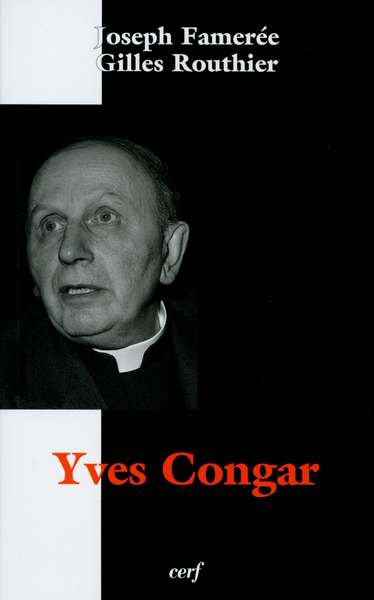Nous utilisons des cookies pour améliorer votre expérience. Pour nous conformer à la nouvelle directive sur la vie privée, nous devons demander votre consentement à l’utilisation de ces cookies. En savoir plus.
YVES CONGAR
Cerf - EAN : 9782204085663
Édition papier
EAN : 9782204085663
Paru le : 2 mai 2008
28,00 €
26,54 €
Disponible
Pour connaître votre prix et commander, identifiez-vous
Notre engagement qualité
-
 Livraison gratuite
Livraison gratuite
en France sans minimum
de commande -
 Manquants maintenus
Manquants maintenus
en commande
automatiquement -
 Un interlocuteur
Un interlocuteur
unique pour toutes
vos commandes -
 Toutes les licences
Toutes les licences
numériques du marché
au tarif éditeur -
 Assistance téléphonique
Assistance téléphonique
personalisée sur le
numérique -
 Service client
Service client
Du Lundi au vendredi
de 9h à 18h
- EAN13 : 9782204085663
- Réf. éditeur : 775089
- Collection : THEOLOGIE
- Editeur : Cerf
- Date Parution : 2 mai 2008
- Disponibilite : Disponible
- Barème de remise : NS
- Format : H:215 mm L:134 mm E:27 mm
- Poids : 395gr
- Interdit de retour : Retour interdit
-
Résumé :
« On pourrait appliquer au théologien Yves Congar ce qu'un jour le philosophe Étienne Gilson avait dit du père Chenu : Un Père Congar, il y en a un par siècle !" La figure de celui-ci est en effet fascinante et impressionnante à plus d'un titre. Voici une vie qui coïncide avec le XXe siècle et ses grandes tragédies. Voici une théologie qui s'élabore en dialogue avec la vie de l'Église catholique, des autres Églises chrétiennes et du monde. On pourrait même dire que le destin de ce théologien se confond avec celui de l'Église au XXe, siècle. N'a-t-il pas en effet accompagné théologiquement les grands renouveaux ecclésiaux qui devaient aboutir au concile Vatican II et être assumés par celui-ci ? Bien plus, ne les a-t-il pas souvent devancés et préparés ? On pense ici tout spécialement à l'oecuménisme, à l'ecclésiologie et à la théologie du laïcat. Le père Congar le reconnaîtra lui-même : "J'ai été comblé. Les grandes causes que j'avais essayé de servir ont abouti au Concile : renouveau de l'ecclésiologie, Tradition, réformisme, oecuménisme, laïcat, mission, ministères... Sans compter la prière liturgique et la fonction doxologique de la confession de foi qu'on y célèbre : des valeurs auxquelles je crois plus que jamais." » Dans ce livre, Joseph Famerée et Gilles Routhier présentent d'abord la biographie intellectuelle de Congar, puis son oeuvre théologique et toutes les grandes thématiques qui structurent sa réflexion. Après ce parcours biographique et thématique, une troisième partie offre deux itinéraires (chronologique et thématique) pour s'orienter dans la géographie, vaste et variée, de l'oeuvre écrite. Dans un quatrième temps, le très grand héritage légué par Congar est éprouvé à l'aune du présent et de l'avenir. Rien ne valant la lecture de l'auteur lui-même, une importante sélection des textes les plus significatifs de Congar est proposée dans la cinquième partie. Enfin, les auteurs proposent les éléments d'une bibliographie essentielle (les écrits congariens et des études qui leur ont été consacrées.
--
One day, the philosopher Étienne Gilson said of Father Chenu : "Men like Father Chenu, there's only one a century!" This could easily be applied to Yves Congar, a fascinating and impressive character in more ways than one. His life coincides with the 20th century and its great tragedies. His is a theology elaborated in dialogue with the life of the Catholic Church and other Christian Churches throughout the world. We might even say that this theologian's destiny runs parallel to that of the 20th century Church. Didn't he accompany, theologically speaking, the great ecclesial revivals which resulted in and were taken into account by the Vatican II council? Moreover, didn't he often foresee and prepare those changes? Ecumenism, ecclesiology and the theology of secularity spring to mind. Father Congar would himself confess: ‘I have been very fortunate. The great causes I tried to serve were treated at the Council: the revival of ecclesiology, Tradition, reformism, ecumenism, secularity, mission, ministries... Not to mention the liturgical prayer and the doxological function of the confession of the faith we celebrate: these values I believe in more than ever.' In this book, Joseph Famerée and Gilles Routhier first of all present an intellectual biography of Congar, then his theological works and all the major themes that structured his reflection. After these biographical and thematic portraits, part three reveals two itineraries (chronological and thematic) to help us find our way in the geography of his written work, so vast and varied. In a fourth part, the great heritage which Congar has left us is tested in the light of the present and the future. Since nothing can outshine the words of the author himself, a generous selection of Congar's most important texts is presented in a fifth part. In conclusion, the authors propose an essential bibliography (Congar's writings and the studies which have been devoted to them)."

